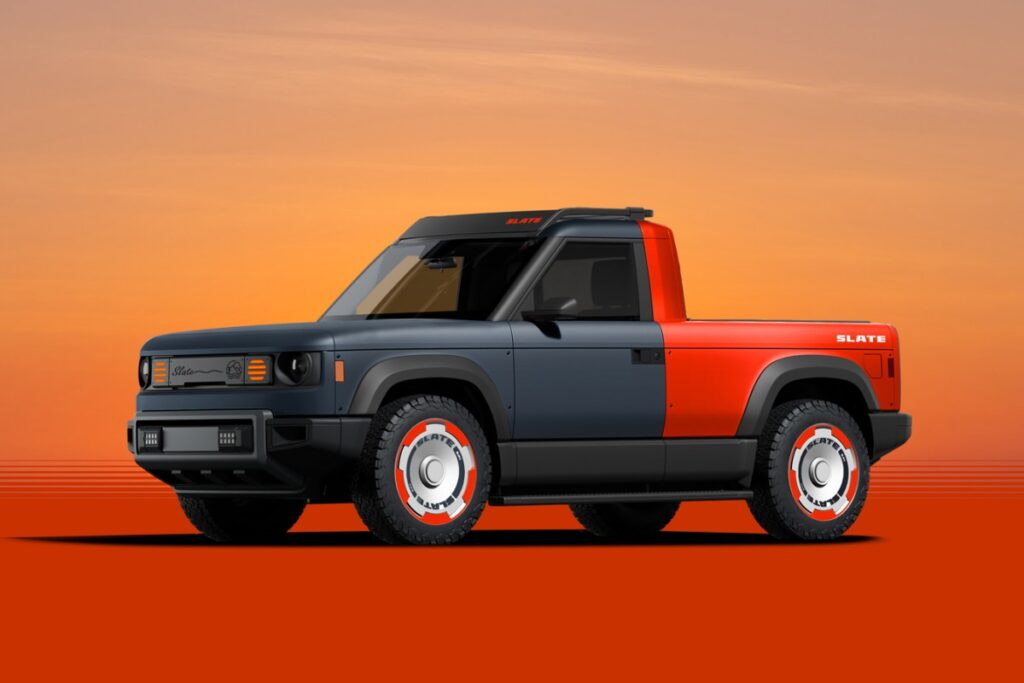
<strong>Image Credits:</strong>Slate Auto
Bezos-Backed Slate Auto EV Pickup Debuts as Anti-Tesla Electric Vehicle Option
Table of Contents
- Introducing the Bezos-Backed Slate Auto EV Pickup
- How Slate Auto’s Approach Contrasts with Tesla’s Vision
- Technical Specifications and Performance Details
- Unprecedented Customization: The Core of Slate Auto’s Strategy
- Transformable Design: From Pickup to SUV
- Pricing Strategy and Affordability Focus
- Bezos Backing and Financial Foundation
- Market Outlook and Challenges Ahead
Introducing the Bezos-Backed Slate Auto EV Pickup
The electric vehicle landscape is witnessing a significant new entrant with the debut of the Bezos-backed Slate Auto EV Pickup. Unveiled during an event in Long Beach, California, this American-designed electric truck represents a fundamental departure from current EV trends. The three-year-old startup has developed what it calls the “Blank Slate,” a highly customizable electric pickup truck that promises to hit the market by the end of 2026 with a price point under $20,000 after federal tax credits.
The Bezos-backed Slate Auto EV Pickup announcement follows TechCrunch’s recent revelation about the company’s plans to enter the U.S. electric vehicle market with manufacturing operations based in Indiana. Behind this ambitious venture stands none other than Amazon founder Jeff Bezos, whose financial backing has helped position Slate Auto to challenge conventional thinking about what an electric vehicle should be.
The Bezos-backed Slate Auto EV Pickup, dubbed “Blank Slate,” features a minimalist design ready for customization. (Image: Slate Auto)
How Slate Auto’s Approach Contrasts with Tesla’s Vision
The Bezos-backed Slate Auto EV Pickup represents perhaps the most diametrically opposed vision to Tesla’s approach to electric vehicles ever brought to market. While Tesla has championed high-tech, screen-dominated interiors, autonomous driving capabilities, and premium pricing, Slate Auto has embraced an entirely different philosophy. As Jeremy Snyder, Slate’s chief commercial officer, explained during the reveal event: “The auto industry has been so focused on autonomy and technology in the vehicle, it’s driven prices to a place that most Americans simply can’t afford. But we’re here to change that.”
Unlike Tesla’s technology-saturated vehicles, the Bezos-backed Slate Auto EV Pickup embraces analog simplicity. It features manual windows and doesn’t come with a standard infotainment screen. This purposeful rejection of technological excess serves two purposes: reducing manufacturing costs and creating a more accessible, less intimidating user experience. CEO Chris Barman reinforced this positioning during the launch event, stating: “We are building the affordable vehicle that has long been promised but never been delivered.” This direct challenge to Tesla’s premium EV strategy highlights Slate Auto’s commitment to democratizing electric mobility.
Key Anti-Tesla Features of the Bezos-backed Slate Auto EV Pickup
- Manual windows instead of electric controls
- No standard infotainment screen (available as an add-on)
- Unpainted body designed for wrapping
- Sub-$20,000 price point (with federal tax credit)
- Focus on physical customization rather than software updates
- Transformable body structure (pickup to SUV)
- Emphasis on DIY modifications and owner engagement
- Designed for affordability over premium features
Technical Specifications and Performance Details
The Bezos-backed Slate Auto EV Pickup may prioritize simplicity, but its technical specifications show thoughtful engineering considerations for its target market. The base version comes equipped with a 52.7kWh battery pack delivering approximately 150 miles of range, powered by a single 150kW motor on the rear axle. For customers requiring more range, Slate Auto offers an upgraded battery option that extends range to about 240 miles. The vehicle will utilize the North American Charging Standard port, the Tesla-established connector now adopted by most major automakers.
In terms of dimensions, the Bezos-backed Slate Auto EV Pickup is notably compact for a pickup truck. With a wheelbase of 108.9 inches and an overall length of 174.6 inches, it’s significantly smaller than the Ford Maverick, which measures 121.1 inches in wheelbase and 199.7 inches in length. The truck features 17-inch wheels and a five-foot bed, with a projected payload capacity of 1,400 pounds and towing capacity of 1,000 pounds. While these towing specifications fall below those of traditional combustion trucks, they align with the vehicle’s positioning as an affordable, practical electric option for everyday use. The front trunk (frunk) offers 7 cubic feet of storage space and includes a drain, making it suitable for tailgating and outdoor activities.
| Specification | Bezos-backed Slate Auto EV Pickup | Ford Maverick (Comparison) |
|---|---|---|
| Battery Size | 52.7kWh (base model) | N/A (ICE/Hybrid) |
| Range | 150 miles (base); 240 miles (upgraded) | N/A (ICE/Hybrid) |
| Motor Power | 150kW rear motor | N/A (ICE/Hybrid) |
| Wheelbase | 108.9 inches | 121.1 inches |
| Overall Length | 174.6 inches | 199.7 inches |
| Payload Capacity | 1,400 pounds | 1,500+ pounds |
| Towing Capacity | 1,000 pounds | 1,500+ pounds |
| Starting Price | Under $20,000 (w/tax credit) | $23,815+ |
Unprecedented Customization: The Core of Slate Auto’s Strategy
Customization sits at the heart of the Bezos-backed Slate Auto EV Pickup’s appeal and business model. The company announced it will launch with over 100 different accessories that buyers can use to personalize their vehicles. Rather than offering a fully-loaded vehicle with features some customers may not want, Slate Auto provides a minimal base model that owners can build upon according to their preferences and budget. This approach not only differentiates the Bezos-backed Slate Auto EV Pickup from other electric vehicles but also creates a potential revenue stream beyond the initial vehicle purchase.
One of the most distinctive aspects of the Bezos-backed Slate Auto EV Pickup is that it doesn’t come painted. Instead, the company emphasizes vehicle wrapping, offering kits that customers can either apply themselves or have installed by Slate Auto. This approach serves multiple purposes: it enables greater personalization, reduces manufacturing costs by eliminating the need for a paint shop, and avoids one of the most heavily regulated aspects of vehicle production. The company even offers customers the ability to name their vehicles with an embossed wrap for the tailgate, reinforcing the “Blank Slate” concept of making the truck truly their own.
Slate Auto University: DIY Support System
To support its customization-focused business model, the Bezos-backed Slate Auto EV Pickup comes with access to “Slate University,” a content hub featuring how-to videos and resources to help owners install accessories and modifications themselves. For customers who prefer professional assistance, Slate Auto will offer installation services through authorized partners. This approach creates an ongoing relationship with customers while potentially generating additional revenue through both parts sales and installation services.
Transformable Design: From Pickup to SUV
Perhaps the most innovative feature of the Bezos-backed Slate Auto EV Pickup is its transformable design. The vehicle can change from a two-seater pickup truck to a five-seater SUV through modular components that owners can install or remove as needed. This flexibility represents a groundbreaking approach to vehicle ownership, essentially providing customers with multiple vehicle configurations in a single purchase. Slate Auto emphasizes that these transformations can be performed by owners without specialized training—”no mechanics certification required.”
The transformable nature of the Bezos-backed Slate Auto EV Pickup addresses a common consumer dilemma: the need for different vehicle types in different situations. Rather than forcing consumers to choose between a pickup’s utility and an SUV’s passenger capacity, Slate Auto allows them to have both in a single vehicle. This capability not only enhances the vehicle’s practical value but also potentially reduces the need for multiple vehicle ownership, aligning with sustainable consumption principles while maximizing the utility of the electric platform.

The Bezos-backed Slate Auto EV Pickup can transform from a two-seater pickup to a five-seater SUV with modular components. (Image: Slate Auto)
Pricing Strategy and Affordability Focus
The Bezos-backed Slate Auto EV Pickup’s sub-$20,000 price point (after federal tax credits) represents a significant milestone in electric vehicle affordability. While the company hasn’t disclosed the exact pre-incentive price, this positioning places it well below current electric vehicle offerings. Slate Auto is accepting $50 refundable reservations through its website, establishing a low barrier to entry for interested customers while building a customer pipeline ahead of production.
This aggressive pricing strategy for the Bezos-backed Slate Auto EV Pickup represents a deliberate inversion of the approach taken by other EV startups like Rivian and Lucid, which began with higher-priced models before attempting to reach more affordable price points. By focusing on affordability from the outset and supplementing revenue through customization options, Slate Auto has developed a potentially more sustainable business model. As CEO Chris Barman noted during the launch: “We believe vehicles should be affordable and desirable. This is a vehicle people are actually going to love and be proud to own.”
Business Model Innovation
The Bezos-backed Slate Auto EV Pickup’s business model resembles the successful “base model plus accessories” approach used in other industries like video game consoles or smartphones, where initial hardware may be sold at lower margins while accessories and add-ons provide higher-margin revenue streams. By applying this model to the automotive space, Slate Auto has the potential to disrupt traditional vehicle pricing structures while creating ongoing customer relationships beyond the initial purchase.
Bezos Backing and Financial Foundation
The Bezos-backed Slate Auto EV Pickup benefits from significant financial resources, having raised over $111 million to date. While Jeff Bezos’s involvement has attracted considerable attention, the company has also secured investment from Mark Walter, Guggenheim Partners CEO and controlling owner of the LA Dodgers. This robust financial backing provides Slate Auto with the capital needed to navigate the challenging process of bringing a new vehicle to market, a journey that has proven fatal for many automotive startups.
With nearly 400 employees already on board and active recruitment ongoing, the Bezos-backed Slate Auto EV Pickup venture has built substantial organizational capacity. The company’s focus on domestic manufacturing in Indiana may provide some insulation from the supply chain volatility and trade tensions that have affected other automotive manufacturers. This combination of strong financial backing, growing workforce, and domestic production strategy creates a foundation that could help Slate Auto succeed where many other EV startups have struggled.
Market Outlook and Challenges Ahead
The road ahead for the Bezos-backed Slate Auto EV Pickup is not without significant challenges. Recent years have seen numerous EV startups like Canoo, Fisker, and Lordstown Motors file for bankruptcy despite substantial investment and market interest. Even established players like Rivian and Lucid continue to face financial challenges as they scale production and attempt to reach sustainable profitability. Slate Auto’s late 2026 target for customer deliveries means the company must navigate a rapidly evolving market landscape over the next two years.
However, the Bezos-backed Slate Auto EV Pickup’s unique positioning offers several potential advantages. Its focus on affordability addresses a significant gap in the current EV market, where prices have remained stubbornly high. The customization-focused business model creates potential for ongoing revenue beyond vehicle sales. And the company’s deliberate simplicity in design may help avoid some of the manufacturing complexities that have plagued other startups. As traditional automakers and established EV manufacturers continue to focus primarily on the middle and premium segments, Slate Auto’s radical approach to electric mobility represents a bold bet that the future of EVs may be more about accessibility and personalization than technological complexity.





